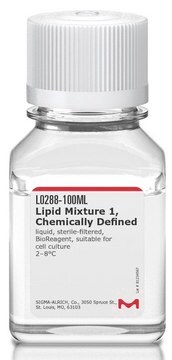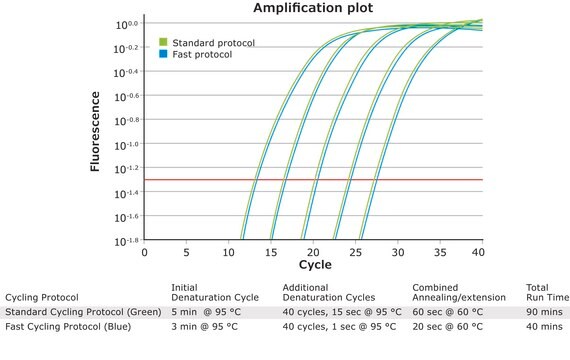LP4
Lipoprotein Deficient Serum, human, 100 mg
LPDS is isolated from fresh human serum by isopycnic ultracentrifugation, and is used for blocking of interfering antibodies.
Synonym(s):
LPDS
Sign Into View Organizational & Contract Pricing
All Photos(1)
About This Item
UNSPSC Code:
41105901
eCl@ss:
26020100
NACRES:
NA.41
Recommended Products
biological source
human
Quality Level
antibody form
serum
manufacturer/tradename
Chemicon®
technique(s)
blocking: suitable (interfering antibodies)
shipped in
dry ice
General description
LPDS is isolated from fresh human serum by isopycnic ultracentrifugation at the lower and upper density limits of the specified density range (Havel et al., 1955). Density adjustments are performed with solid KBr.
Concentration: 35 mg/mL
Source: Fresh human plasma. Tested negative for HBsAg and antibodies to HIV-I, HIV-II and Hepatitis C.
Concentration: 35 mg/mL
Source: Fresh human plasma. Tested negative for HBsAg and antibodies to HIV-I, HIV-II and Hepatitis C.
Quality
QUALITY ASSURANCE:
Protein determined by the Pierce BCA method with BSA as the standard. Purity of each preparation is verified by agarose gel electrophoresis using Fat Red 7B staining for lipid (2,3).
Protein determined by the Pierce BCA method with BSA as the standard. Purity of each preparation is verified by agarose gel electrophoresis using Fat Red 7B staining for lipid (2,3).
Physical form
Dulbecco′s PBS, pH 7.0, without Ca 2+. Filtered through a 0.22 micron filter. Not guaranteed sterile.
Storage and Stability
LPDS may be stored frozen and is quite stable. Cell culture medium containing 3-5 mg/mL of LPDS is approximately equivalent to medium containing 10% Fetal Bovine Serum.
Legal Information
CHEMICON is a registered trademark of Merck KGaA, Darmstadt, Germany
Disclaimer
RESEARCH USE ONLY. This product is regulated in France when intended to be used for scientific purposes, including for import and export activities (Article L 1211-1 paragraph 2 of the Public Health Code). The purchaser (i.e. enduser) is required to obtain an import authorization from the France Ministry of Research referred in the Article L1245-5-1 II. of Public Health Code. By ordering this product, you are confirming that you have obtained the proper import authorization.
Unless otherwise stated in our catalog or other company documentation accompanying the product(s), our products are intended for research use only and are not to be used for any other purpose, which includes but is not limited to, unauthorized commercial uses, in vitro diagnostic uses, ex vivo or in vivo therapeutic uses or any type of consumption or application to humans or animals.
Storage Class Code
12 - Non Combustible Liquids
WGK
WGK 1
Flash Point(F)
Not applicable
Flash Point(C)
Not applicable
Certificates of Analysis (COA)
Search for Certificates of Analysis (COA) by entering the products Lot/Batch Number. Lot and Batch Numbers can be found on a product’s label following the words ‘Lot’ or ‘Batch’.
Already Own This Product?
Find documentation for the products that you have recently purchased in the Document Library.
Customers Also Viewed
Isolation of a human anti-epidermal growth factor receptor Fab antibody, EG-19-11, with subnanomolar affinity from naive immunoglobulin repertoires using a hierarchical antibody library system.
Byung-ung Hur,Jae-bong Yoon,Li-Kun Liu,Sang-hoon Cha
Immunology Letters null
Identification of a nuclear antigen with molecular weight of 48,000 differentially expressed in tumour and normal cells.
W M Krajewska,A Lipi?ska,M Marsza?ek,Z Kilia?ska,Z Wojtkowiak,L K?yszejko-Stefanowicz
Cell Biochemistry and Function null
W M Gonsalkorale et al.
Immunology, 80(4), 611-616 (1993-12-01)
The effects of increasing the level of cyclic AMP (cAMP) activity on lymphocyte proliferation in the rat mixed lymphocyte reaction (MLR) were investigated. Dibutyryl cAMP (dbcAMP) and prostaglandin E2 (PGE2) produced a dose-dependent reduction in proliferation in the lymph node
Bursting firing of action potentials in central snail neurons elicited by d-amphetamine: role of the electrogenic sodium pump.
M C Tsai,Y H Chen
Comparative Biochemistry and Physiology. Part C, Pharmacology, Toxicology & Endocrinology null
Second messenger-dependent protein kinases and protein synthesis regulate endogenous secretin receptor responsiveness.
Roxana S Ghadessy,Eamonn Kelly
British Journal of Pharmacology null
Our team of scientists has experience in all areas of research including Life Science, Material Science, Chemical Synthesis, Chromatography, Analytical and many others.
Contact Technical Service







